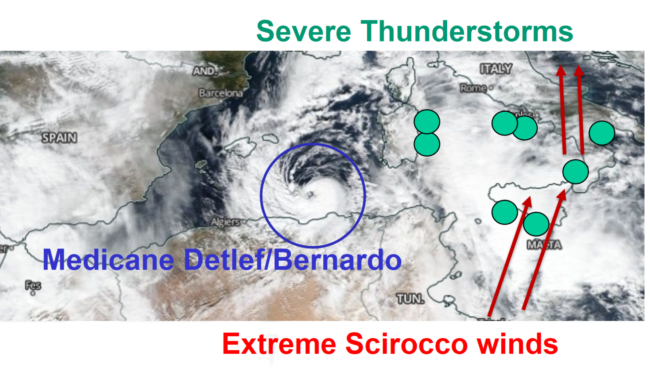
A Mediterranean cyclone, high tides and climate change: these three ingredients made the 12/11/2019 acqua alta event in Venice exceptional. This combination of causes determined what climate scientists define as a compound extreme event, a non-linear mix of factors which led to several and connected extreme weather phenomena in the Mediterranean area.
Let us start by the analysis of the atmospheric circulation in the last two or three weeks: with respect to an average month of November, we had more blocked atmospheric configurations, resulting in cyclones moving southward rather than eastward. When the relatively cold atmospheric air coming from polar latitudes meets the warm surface of the Mediterranean Sea, extratropical cyclones change their characteristics into near-tropical depressions. These hybrids – termed “medicanes” by climate scientists and meteorologists – can be very damaging because of the strong winds and the intense convective precipitation (thunderstorms) originating around the eye of the storm. The medicane Detlef formed near the coast of Algeria on Monday 11/11/2019 and caused damaging storms in the area. Moving towards the African continent, it lost energy until it reached again the Mediterranean Sea in the so-called Stretto di Sicilia. Here the medicane gained force again and was renamed as Bernardo. It then started moving northward slowly. For several hours strong Scirocco (SE) wind blew in the Ionian and Adriatic Sea. Wind gusts up to 188 km/h were recorded in Novara di Sicilia, near Messina. The associated thunderstorms hit violently the south of Italy and particularly the beautiful city of Matera where ancient houses which are dug into the mountains – the so called Sassi, an UNESCO heritage – were flooded. The most iconic images of the phenomena associated with Bernardo came however from Venice. Here the combination of strong Scirocco wind and high tides triggered an exceptional acqua alta event (187cm). San Marco’s cathedral was flooded for the 6th time in its history. The cost of the storm was estimated by the city council in several million euros.
Was the acqua alta caused by climate change? Sea-level has risen globally by about 20cm in the last century making the acqua alta tide higher than what Casanova would have observed with similar atmospheric conditions at his time. Other causes of the exceptional acqua alta tide may have changed since the Doges’ period: the atmospheric circulation is also experiencing changes due to anthropogenic forcing. These changes are difficult to determine because they are embedded in the chaotic short and long term fluctuations of weather patterns. Some recent studies have shown how such changes must be taken into account when determining future extreme events. Existing studies on Mediterranean cyclones also show that they might intensify in the future, as they will be able to drain more and more energy from a warmer Mediterranean Sea. With sea-level rise expected to increase up to 100cm by the end of the next century and more storms possibly hitting the Mediterranean area, scientists are urging to develop mitigation and adaptation strategies to protect our human, cultural and social heritage.
